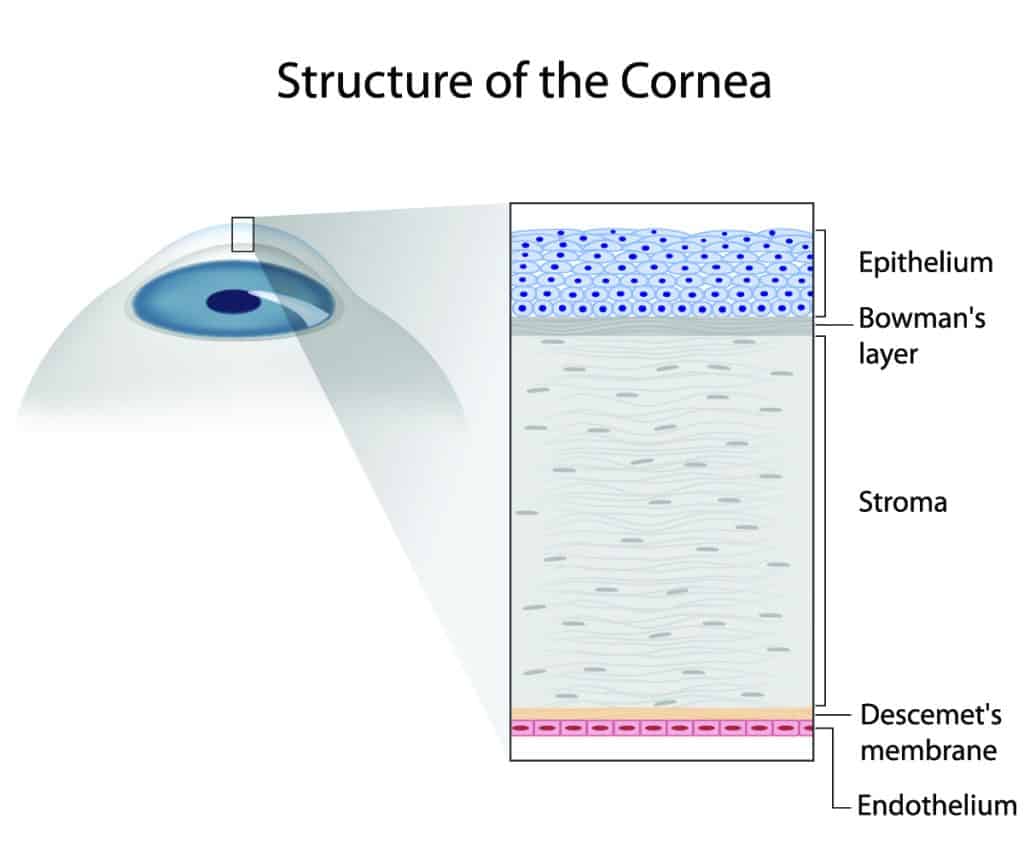
The front portion of your eye is the cornea, which acts as a window, refracting incoming light onto the retina at the back of the eye. This structure is vital for clear vision. A misshapen cornea causes poor eyesight in the form of nearsightedness, farsightedness and/or astigmatism. Corneal diseases, infections and other conditions can also lead to poor vision and jeopardize your eye health. At Boston Eye Physicians and Surgeons, we offer high-quality eye care and treatments for various problems with the cornea.
1. Keratitis
Keratitis is a corneal ulcer, or open sore on the cornea. It is typically caused by a bacterial, viral or fungal infection. Poor contact lens care or hygiene such as failure to wash your hands before placing contact lenses in your eye or forgetting to remove them before bed may cause keratitis. People who wear contacts, use steroid eye drops or have dry eye disease, eyelid issues or a corneal injury are more at risk for keratitis. Keratitis is treated with eye drops that target the cause, such as antibiotics or antifungals. Symptoms include:
- Eye redness
- Eye pain or soreness
- Feeling of something in your eye
- Tearing
- Blurry vision
- Light sensitivity
- Eyelid swelling
- White mark on the cornea
- Discharge or pus
2. Ocular Herpes
Herpes can cause infections in several areas of the body, including the eyes. Ocular herpes is often due to the herpes simplex virus I (HSV) that also leads to cold sores. Genital herpes, or HSV II, may also cause breakouts in the eye. There is no cure for ocular herpes, but treatments such as antiviral medications are available to mitigate symptoms and control the virus. Symptoms of ocular herpes may include:
- Ocular pain
- Light sensitivity
- Blurred vision
- Mucous discharge
- Redness
- Eyelid swelling
- Tearing
- Blisters on the upper eyelid or forehead of the affected side
Ocular herpes must be treated to avoid spreading to other eye structures.
3. Herpes Zoster (Shingles)
When you have chickenpox, the virus lives in your body and can re-activate years —even decades — later as herpes zoster or shingles. When this viral disease affects your eye and the surrounding tissues (herpes zoster ophthalmicus) it can cause severe eye problems such as inflammation, corneal ulcers and glaucoma.
Shingles of the eye may develop at the same time as the skin rash and pain or after those lesions have healed. Antiviral medication can help, but it’s critical to see an ophthalmologist to avoid severe eye complications. Symptoms of herpes zoster include:
- Blurred vision
- Rash or redness in the skin around the eye
- Blistering on the forehead or upper eyelid
- Itching, throbbing or burning around the eye
- Severe skin sensitivity
- Redness, irritation or tearing in the eye
4. Keratoconus
Keratoconus is when the cornea weakens and thins, changing in shape from spherical to cone-like. The abnormal curvature of the cornea causes visual impairment that worsens over time. The condition is often diagnosed in a person’s teenage years or early 20s. Early diagnosis may mean the condition can be addressed with mild treatments like soft or rigid gas permeable (RGP) contact lenses. Corneal cross-linking is a revolutionary new treatment option that can halt the progression of keratoconus and salvage your vision. Symptoms of keratoconus include:
- Blurred vision
- Light sensitivity
- Light halos
- Eye pain or eyestrain
- Headaches
- Itching sensation
- Difficulty reading, watching TV or driving at night
5. Corneal Dystrophies
Corneal dystrophies refer to a set of rare genetic eye disorders. These conditions typically affect both eyes and occur when material from another layer (or multiple layers) in the eye builds up in the cornea. The cornea, or “window” of the eye, is no longer transparent, causing vision loss and blurriness. Corneal dystrophy has a range of symptoms because there are more than 20 variations. You may experience no symptoms or have sensitivity to light, feel like something is in your eye or mild to severe eye pain. If you have a family history of corneal dystrophy, you are more likely to develop the condition.
Contact Boston Eye Physicians and Surgeons
If you are experiencing symptoms of a corneal condition, it’s essential to schedule an eye exam to determine the cause of your eye pain and start treatment as soon as possible. Schedule your appointment at Boston Eye Physicians and Surgeons in Brookline today by calling (617) 232-9600.

